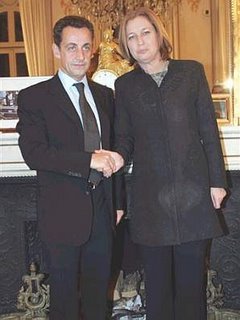Eurabia: The good, the bad and the ugly - Part 2 - The Bad (and the Delusional)
 There are several stories coming out of Europe relating to Israel today. Some of them strain credibility, others may be wishful thinking. But I'm going to try to separate them out for you so that you will hopefully be aware of what is going on. I started to do this as one post, but decided it was too long and cut it into three. This is Part 2 - The Bad (and the Delusional).
There are several stories coming out of Europe relating to Israel today. Some of them strain credibility, others may be wishful thinking. But I'm going to try to separate them out for you so that you will hopefully be aware of what is going on. I started to do this as one post, but decided it was too long and cut it into three. This is Part 2 - The Bad (and the Delusional).The Bad: The bad needs to include the delusional in this case. Foreign Minister Tzipi Livni is in Paris today (is her French as 'good' as her English?) where she met with French interior minister and Presidential candidate Nicolas Sarcozy (whom my friend Atlas Shrugs says is going to be the next President of France) and where she will meet later today with current French President Jacques Chirac. (Doesn't Sarcozy look thrilled to be holding her hand? :-) Livni is going to beg Chirac not to abandon the 'road
the Gaza cease-fire and Prime Minister Ehud Olmert's address at Sde Boker last week have created a new momentum and laid out a political horizon, and therefore there was no reason to begin developing new diplomatic plans or initiatives.That's part 1 of the delusional. I agree that there is no need for new diplomatic plans or initiatives, but that's because there's no point to them. The 'Palestinians' still aren't willing to accept the existence of the State of Israel. The
Part 2 of the delusional is that Livni is claiming that 'pressure' by the 'international community' on Hamas is bearing fruit.
"Almost a year after Hamas came to power, we are beginning to see signs of change, which is partly due to pressure by the international community," Livni said at the beginning of her two-day visit during which she is scheduled to meet French President Jacques Chirac in Paris and press him not to abandon the road map or water down the international community's three criteria for dealing with the Palestinian Authority government.On the same day that Livni came out with that 'brilliant' statement, Eurabia announced that it increased
The EU said its contribution to the Palestinians has increased by 27 percent from last year, to $865 million, though the EU, United States and Israel have banned direct aid to the Palestinian government.That sure doesn't sound like much of a cutoff in the handouts, which would make the 'sanctions' weak to non-existent.
One tool is a temporary funding mechanism that funnels money directly to the people and projects, bypassing the government. The EU and its member states have contributed $266 million to the temporary mechanism, administered by the World Bank.
The "Quartet" of Mideast mediators - the EU, U.S., Russia and United Nations - set up the temporary funding procedure in July, as economic hardships from the aid cutoff hit ordinary Palestinians because of their choice of a Hamas-led government.
The EU, U.S. and Israel list Hamas as a terror organization. The Islamic militant group swept a parliamentary election and took office in March, triggering the Western aid cutoff. Also, Israel suspended about $55 million in monthly transfers of taxes collected for the Palestinians.
Since then, however, Western governments and aid groups have found ways to get money to the people. Some funds are directed to the office of Palestinian Authority Chairman Mahmoud Abbas.
Mario Mariani, director of the temporary funding program, said the temporary funding mechanism is up for renewal in December. The latest payout was NIS 1,000 shekels to the families who used to receive benefits from the now bankrupt Palestinian Ministry of Social Affairs, including widows, orphans and handicapped.
The EU is the biggest donor to the Palestinians, providing around $595 million a year. Most of that is channeled through UN assistance programs and NGO projects, but $83 million from the EU's common budget last year was placed in a World Bank trust fund for direct payments to help the Palestinian Authority cover its day-to-day costs.
At the same time, Hamas officials say contributions from Arab nations are increasing, easing hardships that have resulted from the government's inability to pay its 165,000 employees, triggering strikes.
Samir Abu Eisheh, the acting finance minister, said about $400 million were collected from Arab countries - 90 percent from Arab governments. Most of it went for salaries and ministry budgets, he said.









0 Comments:
Post a Comment
<< Home